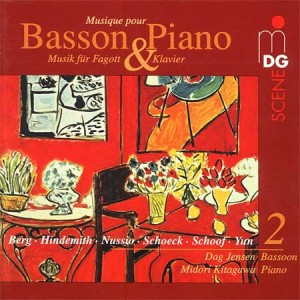
Dag Jensen, bassoon
Midori Kitagawa, piano
Paul Hindemith (1895-1963): Sonate
Olav Berg (*1949): Vertigo (1992) + Sonatine (1995)
Othmar Schoeck (1886-1957): Sonate op. 14
Othmar Nussio (1902-1990): Variazioni su un’ Arietta di Pergolesi
Isang Yun (1917-1995): Monolog für Fagott solo
Manfred Schoof (*1936): 2 Impromptus (1993)
Die CD ist erschienen bei:
Musikproduktion Dabringhaus und Grimm/ MDG 603 0831-2
Bachstraße 35, D-32756 Detmold
Tel. +49 -(0)5231-93890, Fax +49 -(0)5231-26186
„Dies ist die zweite CD „Bassoon et Piano“; Nr. 1 enthält französische Musik des 20. Jahrhunderts (Koechlin, Mihalovici, Bozza, Bitsch und Dutileux). Nr. 2 wendet sich nunmehr dem deutschsprachigen Raum zu; Olav Berg ist Norweger, Nussio Italiener in der Schweiz, und bis auf den in Berlin verstorbenen Yun ist der Rest deutsch.
Zwei der sieben Stücke sind ursprünglich für Baßklarinette (Schoeck und Yun), doch die Adaption für Fagott scheint mir legitim. Die ganze Palette des 20. Jahrhunderts ist auf dieser CD versammelt: von der traditionellen Musik der Pergolesi-Variationen Otmar Nussios bis zur jungen Avantgarde Bergs.
Am überzeugendsten in dieser Richtung: Manfred Schoofs 2. Impromptu mit der spannenden Verbindung von Jazz und new sounds auf dem Fagott und dem pizz im Innenraum des Klaviers: das ist fantasievoll und klingt sehr gut.
Dag Jensen und Midori Kitagawa sind ein hervorragendes Duo. Beide spielen technisch makellos, aber das ist ja eh selbstverständlich. Doch manchmal verschmelzen die so verschiedenen Klangfarben zur idealen Einheit: das hört man selten.
Und: Virtuosen, die musikalisch so richtig und klar spielen wie Jensen, gibt es nicht überall. Als Beleg dafür höre man nur die Vorbereitung der Reprise in Hindemiths erstem Satz.
Diese CD enthält viele Neuentdeckungen. Und sie zeigt zwei Musiker, die wissen, wie es geht.
Für Fagott-Fans ist diese CD ein absolutes Muß. Und für den, der dieses Instrument noch nicht entdeckt hat, für den ist hier die Chance zur grand amour.“
(Albrecht Gürsching, Tibia, 2/99)
„Superlative Playing from Norwegian virtuoso Dag Jensen in a marvellously varied and enjoyable 20th-century collection with works ranging in style from the late Romanticism of Othmar Schoeck through the avant-garde of Yun an Olav Berg to the jazz influenced Manfred Schoof.“
Performance: ★★★★★
Sound: ★★★★★
(Tim Payne, BBC Music Magazine, March 1999)
“ – Fanfare: the performances are splendid… splendidly assembled recital… absorbing and entertaining. –
Much the same could be said about this second volume, devoted for the most part to German composers, the exceptions being the Norwegian Olav Berg (b. 1949) and the Italian Otmar Nussio (1902-90), with the Korean-born Isang Yun apparently an adopted son due to his longtime residence in Berlin.
The programm offers a nice variety of styles and settings that belie the bassoon’s second-tier reputation. The Neoclassical sonatas by Hindemith and Othmar Schoeck present the instrument with an opportunity for smooth melodic phrasing, and while I’m a fan of Hindemith’s music in general I enjoyed the momentum-building juxtaposition of light and dark motifs in the Schoeck even more.
The rather conventional sequence of variations on a Pergolesi song by Otmar Nussio takes advantage of the bassoon’s exaggerated character, essaying moods from playful to mournful, including an accelerating, gnomelike dance á la „In the Hall of the Mountain King.“
Olav Berg’s solo bassoon piece „Vertigo“ ventures into the extremes of the instrument’s high and low registers but doesen’t seem to impose a sense of direction upon its fluid lyricism; the same composers Sonatine is a much stronger work, benefiting from the support of the piano.
Isang Yun’s „Monologue“, originally written for bass clarinet, is the most „modern“ of these works, its melodic line incorporating microtonal bent notes and large interval leaps and using tonal variety – from a pure, rounded sound to a biting tone and a drill-hard, piercing siren – to alter the mood of the monolog.
Finally, though he is better known as a jazz trumpeter, Manfred Schoof’s Two Impromptus reveal little jazz influence outside of some syncopated interplay reminded me of Francis Poulenc in his darker moments (say, his Clarinet Sonata), and happily brought the piano up to the position of an equal partner for the first time.
Both of the players are top-notch. If you’ve read this far, you’re probably attracted to the instrument or curious about the program, so why not go for it?“
(Art Lange, Fanfare, 3-4/99)